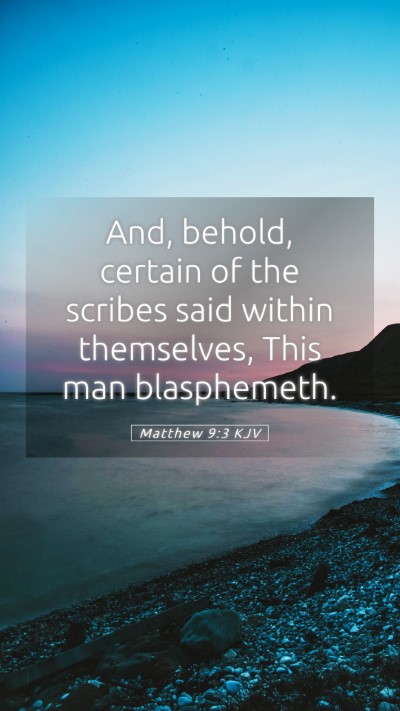Understanding Matthew 9:3
Verse: "And, behold, certain of the scribes said within themselves, This man blasphemeth."
Introduction: Matthew 9:3 is a notable verse where the opposition to Jesus begins to surface among the scribes. This commentary seeks to explore the Bible verse meanings, Bible verse interpretations, and the significance of this scripture within its context.
Contextual Background
This moment occurs after Jesus has performed miracles, specifically healing a paralytic. The reaction of the scribes represents a critical moment in Jesus’ ministry, reflecting the growing tension between Him and the religious authorities of the time.
Analysis from Public Domain Commentaries
-
Matthew Henry's Commentary:
Henry emphasizes that the claim of blasphemy reveals the hard-hearted nature of the scribes, who were unable to see the divine authority behind Jesus' actions. Their accusation stems from a misunderstanding of the nature of Jesus' authority to forgive sins, a theme central to the chapter.
-
Albert Barnes' Notes:
Barnes notes that the reaction of the scribes is indicative of their rigid adherence to the Law of Moses. They cannot accept that anyone, especially Jesus, could claim equality with God by speaking forgiveness to sinners. This moment propels a central theme in the Gospels: the conflict between law and grace.
-
Adam Clarke's Commentary:
Clarke argues that the scribes’ thoughts reflect a deeper spiritual blindness. He suggests that the term "blaspheme" used by the scribes indicates their failure to grasp that Jesus was not against the Law but instead embodied the fulfillment of it. Clarke connects this to the broader narrative of the New Testament, where Jesus often challenges the legalistic interpretations of the Law.
Bible Verse Explanation
This verse illustrates a pivotal moment in the ministry of Jesus where divine authority clashes with human legalism. The scribes’ inward thoughts show a lack of faith and highlight the tension between Jesus’ teachings and traditional religious beliefs.
Cross References
- Mark 2:7: "Why doth this man thus speak blasphemies? who can forgive sins but God only?"
- Luke 5:21: "And the scribes and the Pharisees began to reason, saying, Who is this which speaketh blasphemies? Who can forgive sins, but God alone?"
- Matthew 12:24: "But when the Pharisees heard it, they said, This fellow doth not cast out devils, but by Beelzebub the prince of the devils."
Application and Implications
The challenge presented by this verse goes beyond understanding its historical context. It encourages readers to consider how legalism can blind us to the grace and authority of Jesus in our lives today.
Conclusion
In summary, Matthew 9:3 serves as a profound example of the conflict between divine grace and human tradition. By exploring this verse through Bible study insights and commentaries, we gain a richer understanding of how Jesus' message challenges us to move beyond legalism into a relationship grounded in faith and forgiveness.
Further Study
For those seeking deeper insights, consider engaging in Bible study groups or utilizing online Bible study tools to explore related themes in the Gospel of Matthew.


